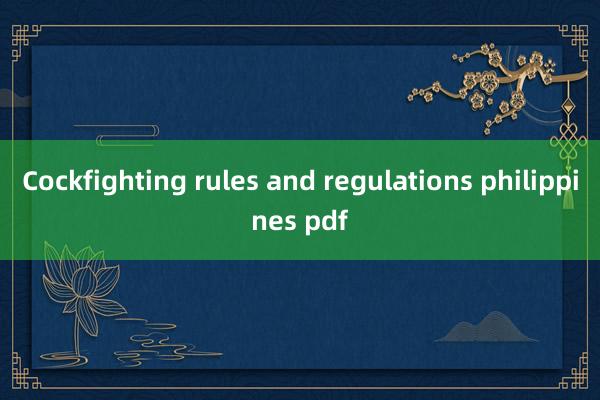
Cockfighting Rules and Regulations in the Philippines: An Overview
Cockfighting, or "sabong" as it is locally known, has been an integral part of Filipino culture for centuries. It is a highly popular sport and social activity in the country, drawing large crowds and fostering a strong sense of tradition. While the practice may be controversial in other parts of the world, in the Philippines it is legal, though regulated under strict rules to ensure the safety of participants and spectators, as well as the fair treatment of the animals involved. Understanding the rules and regulations that govern cockfighting in the Philippines is important for anyone interested in the sport, especially for those seeking to participate legally.
Cockfighting is governed primarily by Presidential Decree No. 449, known as the Cockfighting Law of 1974. This decree outlines the rules and restrictions surrounding the sport, specifying when and where cockfights can be held and who is permitted to participate. Additionally, Republic Act No. 7160, also known as the Local Government Code of 1991, gives local government units the power to regulate cockfighting within their jurisdictions, which has led to some variation in enforcement from region to region.
Under the Cockfighting Law, there are several key restrictions:
The rules surrounding the conduct of cockfights are designed to ensure fair play and maintain the integrity of the sport. Fights are typically organized between two gamecocks, each equipped with a sharp blade called a "gaff" or "tari" attached to one of their legs. The main objective of the fight is for one rooster to incapacitate or kill the other.
Key regulations for the conduct of cockfights include:
go88 comAlthough cockfighting may seem harsh to outsiders, there are animal welfare regulations in place to minimize cruelty. Gamecocks are often treated with care by their owners, who invest significant time and resources into their training and well-being. There are also rules regarding the proper handling and care of roosters before and after the fight. For example, gamecocks must be in good health and free from any external substances that could enhance their performance unfairly.
Local governments and cockfighting associations may impose additional welfare rules, including mandatory rest periods between fights and specific requirements for the living conditions of the gamecocks.
Violating the rules and regulations surrounding cockfighting can result in significant penalties. Illegal cockfighting, such as holding a fight in an unlicensed location or on a non-designated day, can result in hefty fines, imprisonment, or both. Likewise, individuals caught using performance-enhancing drugs on their roosters, or placing illegal bets, can also face legal repercussions.
In addition to criminal penalties, violators may also face administrative sanctions, such as the revocation of their licenses or permits. Local governments, in coordination with law enforcement agencies, are responsible for monitoring compliance and cracking down on illegal cockfighting operations.
Cockfighting remains a significant part of Filipino culture, but it is also a highly regulated activity to ensure fairness, public safety, and some level of animal welfare. Those interested in engaging in or attending cockfights in the Philippines should be aware of the various legal, ethical, and procedural regulations that govern the sport. By following these guidelines, participants can ensure that they are in compliance with the law while respecting the traditional aspects of this deeply rooted practice.
Jili slot club registerwww.krtutorplus.com